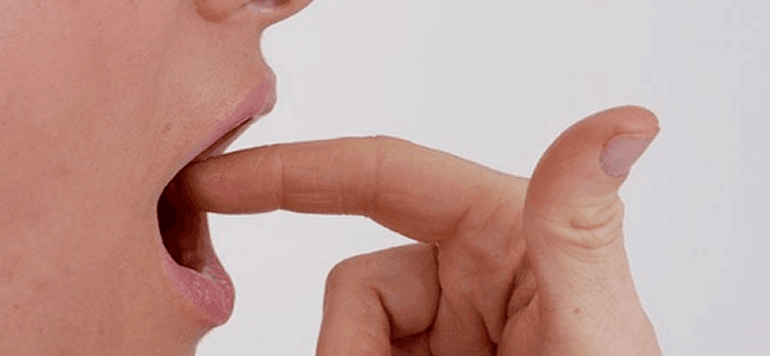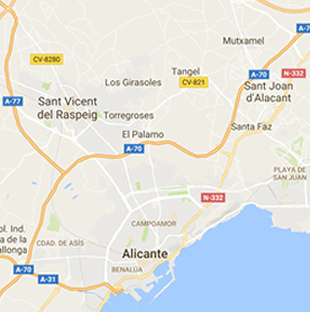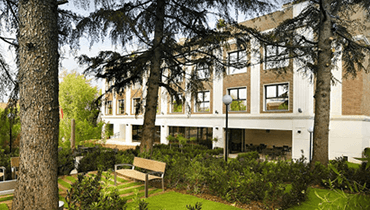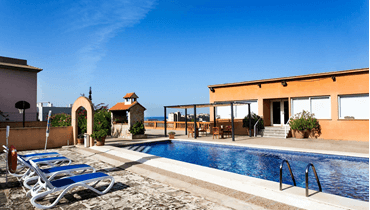Bulimia and Anorexia

With a Bulimia and Anorexia are quite possibly two of the worst disorders to treat and there are inherent risks in treating both.
- Rehab options in Alicante
- Admissions assessment by phone
- Travelling to Alicante alone or with a nurse
- Drug or Alcohol Detox Process in the Hospital
- Rehabilitation process in theAlicante rehab center
- Rehabilitation Process in Alicante
- Therapy and Activities
- Recovery Process
- Discharge Process
- Ongoing Recovery System
Rehab Alicante Overview
Bulimia, anorexia and other difficulties in relation to food
Among the different food difficulties that a person can present, bulimia and anorexia are the most widespread. In fact it is even entangled to separate them as distinct entities, perhaps they should be called: "Difficulties in relation to food" as a general way. There are some fairly generalized clinical expressions but it is debatable whether there would be a specific pathology or only phenomenological manifestations registered in other types of classifications. In general, both bulimia and anorexia have become widespread, on the one hand because since the end of the twentieth century the casuistry has increased considerably, on the other hand they have been taken with enough space in the media,
It is accepted that to think about the clinic an open approach is needed in which different aspects converge. For explanatory purposes, two main approaches can be defined to think about the problem. One based on the underlying idea of behavior fostered by prior conditioning. In this way, for example, when a teenager would incorporate contemporary beauty standards, the efforts to reach them would be infinite. The treatment then would be to guide the person towards other behaviors and values.
Another of the basic approaches states that since not all people who receive certain stimuli respond in the same way, the underlying aspects that subjectively influence a given clinical manifestation should be traced. The common symptoms are due to a cultural propagation of the same, therefore the conception of "blaming" the canons of beauty and thinness would be taken as ground to pass to a reading committed to the singular subjectivity. Thus, the wide dissemination of people suffering from these pathologies would contribute in part to the same diffusion, which would identify the disease. Another aspect to consider is in terms of the definition "anorexia nervosa" or "bulimia nervosa" (nervous underlining). This is due to medical differentiation according to which when a person refuses to eat it can be the unintended result of some medical treatment or illness. But it is worth clarifying that the nervous word complicates things and discussions, since it is a term extracted from medicine not from the field "psi".
According to the diagnostic manual of mental disorders DSM-IV within the eating behavior disorders can be cited:
Anorexia nervosa: defined as "the refusal to maintain body weight equal to or above the normal minimum value (85% lower as expected), intense fear of becoming obese, altered perception of weight or silhouette. In prepubertal women, the presence of amenorrhea (at least three consecutive cycles) ". According to the manual, if anorexia is accompanied by binge eating (see definition below), purging and provoked vomiting is then termed anorexia of the compulsive / purgatory type.
Bulimia nervosa: is defined by the presence of recurrent binge eating, inappropriate compensatory behavior in order to gain weight (at least twice a week for a period of three months), provocation of vomiting, use of laxatives, diuretics, enemas, drugs , fasting, excessive exercise. If you do not regularly resort to induce vomiting or use laxatives, diuretics or enemas in excess then it is called bulimia nervosa of the "non-purging" type
What is a binge ?: According to the DSM-IV is when food is swallowed in a short space of time in superior quantity, it is accompanied by the sensation of loss of control over the intake of food and of not being able to stop eating.
According to ALUBA (Association for the fight against bulimia and anorexia in Argentina) cultural patterns have determined that thinness is synonymous with social success. Many (...) young people struggle to achieve the "ideal physique" motivated by models, artists or by commercial advertising (...) BULIMIA and ANOREXIA NERVIOSA, two complex alimentary diseases.
There are visible signs characteristic of BULIMIA:
Constant concern for food (talks about weight, calories, diets ...).
Binge, eat compulsively, hide food.
Fear of getting fat.
Go to the sink after eating.
Self-induced vomiting, abuse of laxatives or diuretics.
Use drugs to lose weight.
Perform rigorous and rigid regimes.
Physiological signs: Modification of character (depression, feelings of guilt or self-hatred, sadness, feeling of lack of control ...) Severe self-criticism. Need to receive the approval of others regarding their person. Changes in self-esteem in relation to body weight. Inflammation of the parotids. Small vascular ruptures in the face or under the eyes. Chronic throat irritation. Fatigue and muscle aches. Inexplicable loss of dental pieces. Weight oscillations (5 or 10 Kg, up or down).
Regarding ANOREXIA, the visible signs:
Pathological behavior Restrictive eating behavior (low amount of food) or severe diets. Rituals with food such as: counting calories, chopping up food into small pieces, preparing food for others and not eating.
Intense fear of gaining weight, struggling to keep weight below normal.
Fear of being forced to eat in society (parties, family reunions ...).
Hyperactivity (excess of gymnastics or other sports).
Hide the body under loose clothing.
Refusing to wear bathing clothes and seeing your body.
Occasionally, binge eating and use of laxatives or diuretics. Sweetener abuse.
Physiological signs: Progressive weight loss (often happens in a short period). Lack of menstruation or delay in its appearance without known physiological cause. Paleness, hair loss, cold sensation and bluish fingers. Weakness and dizziness Change of attitude: Change of character (irritability, anger). Depressive feelings Insecurity in terms of their abilities. Feelings of guilt and self-loathing for having eaten or for fasting. Social isolation.
In both pathologies (bulimia and anorexia) if people are not treated can reach death as a cause of the disease. Your health is in danger (...) problems in (studies) work, with family and society. They will lose their self-esteem and their personality will deteriorate. They will not achieve independence or self-sufficiency. Possibly they do not get the necessary social insertion. Over time, there is a very low quality of life and ideas or acts of suicide may appear. In this sense, Aluba recommends that everyone's collaboration is needed. From an organized institution. From an interdisciplinary team specialized in food pathology. From a self-help group that encourages the patient to fulfill his life project. From a self-help group for parents that optimizes the efforts of help, communication and family coexistence, as well as the personal development of each and every one of its members. From friends who understand the disease and help its healing.
According to psychoanalysis (French school):
One can not talk about specific psychopathology for bulimia or anorexia, in any case it is about clinical or phenomenological manifestations framed in a larger structure. From the psychoanalysis and from other positions also, by not explaining these entities from the point of view of cause - effect - fault, the "advertising" possibility of explaining to the mass public and in a simple way the particular characteristics is lost. But it should be clarified that the generalized idea that the western image of the thin woman, favoring or "causing" food pathologies is broken. It is more a question of provoking a structural vacuum against the unalterable demand of the Other (with capital letters). Thus, there is an eating "nothing" or eating "everything", of trying unsuccessfully the provocation of a symbolic metaphor that limits the loss of the subject's being. The notion of desire is structurally linked to the notion of lack, in this sense fits the mythical example, where a child crammed with food may end up refusing to feed by symbolically (although unsuccessfully) recreating a lack that is blocked by the fulfillment of needs . In this sense, the rejection of food takes on the desiring dimension. An emptiness provoking as a restorative element, something that breaks the whole (nothing), or something that breaks the whole, the (vomit). In this sense, in the case of hysteria (important number of cases) it demonstrates with its fantasmatic of the desiring problematic it does not fall on a particular object (in this case the food), but it moves permanently because in definitively it is directed to a fault. If we talk then of the order of hysteria it would be in the privacy, without scenes, not being able to finish learning about the body, about sexuality, hence the infantile position, and about the refusal to sexual life or amenorrhea, because the libidinal energy This is the sevice of the symptom. On the other hand psychoanalytically we could not speak of "psychosomatic phenomenon", because the psychosomatic is of the lesional order and here it is about the functional order, because weight loss is a consequence of not eating, and not the other way around. Depending on the case, the order of the phobia (food) can be discussed. From the order of psychosis, although this would be another diagnosis, it would be a clinical expression but not anorexia or bulimia. It is clear that it would not be of the perverse order, because although it denies the food and its body (its corporal scheme is deteriorated), it does so from the neurosis in relation to the phallic enjoyment. In the case of bulimia, rituals refer to obsessive traits, but only in a descriptive sense, not structurally.
How the treatment works in the Alicante rehab center.
The approach is based on the Dutch system which of course everyone knows is one of compassion and tolerance to drug addiction.
Addiction treatment can normally be considered a mental health issue and before a person can recover they need to be fully assessed to see if they have any underlying mental health issues that would cause someone to look for ways to self medicate.
Travelling to the Rehab in Alicante for treatment
People travel from benidorm and the UK
What is involved in the treatment?
There is outpatient treatment available for people within travelling distance of the alicante clinic. What is travelling distance? Benidorm is close and we consider anything within an hour travelling distance such as Torrevieja, San Pola and even Javier
For those coming from a long distance to Alicante we have a 28 day all inclusive residential rehab program.
The treatment follows a holistic approach which means that rather than just treating the addiction as a problem there is also lots of seeking for the reasons and causes of the addiction.
A full medical team is always present in the clinic and available to you at the early stages of the detox and start of the rehabilitation.
The residential detox and rehab program lasts for 28 days normall and has a structured program for each day.
You will be welcomed into the tranquil and relaxing private rehab facility very near the beach.
The Drug Rehab in Alicante is the main place people from Elce and Benidorm attend.
Contact us for Rehabilitation in Alicante
![]() If you see a green border round the padlock your connection is encrypted and secure.
If you see a green border round the padlock your connection is encrypted and secure.
Local Rehabs is English Speaking, Private, Secure, Highly Ethical and Most Trusted. You can be sure of complete discretion.

 Nice room in Alicante Addiction Treatment Center
Nice room in Alicante Addiction Treatment Center




